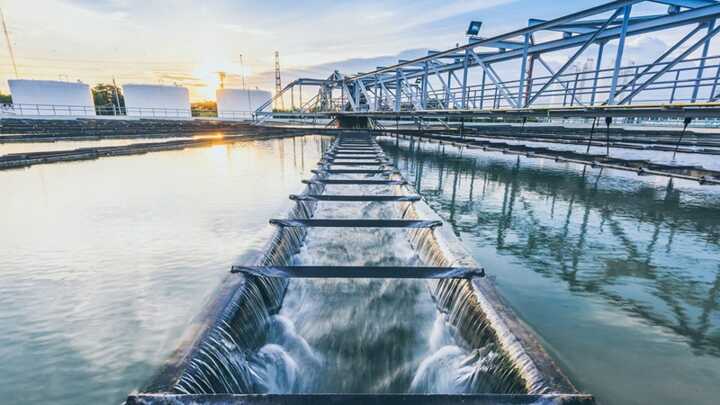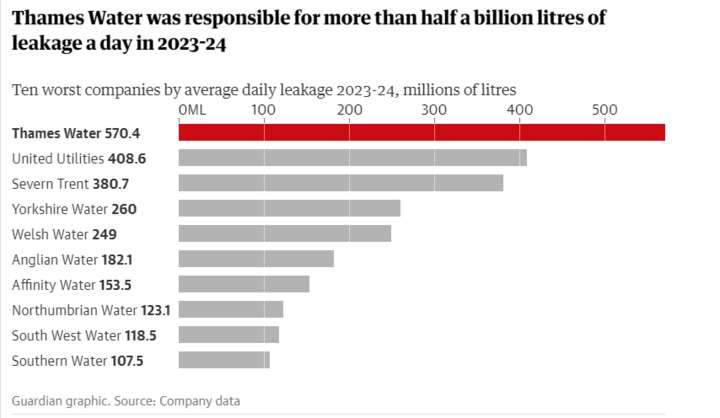

Hundreds of millions of litres were wasted every day, with Thames Water revealed as the worst offender
Water companies in England and Wales lost more than one trillion litres of water last year in leaks, the Observer can reveal.
The figures, based on the companies’ 2023-24 annual performance reports, show that millions of litres of water were leaked every day.
The worst performer was Thames Water, which leaked 570.4 megalitres a day last year, or more than 200bn litres in total, equivalent to just under a quarter of its entire water supply. A megalitre is one million litres.
The company said in its 2023-24 annual report that this was “our lowest ever leakage”.
Thames Water was placed under special measures in July and is in more than £15bn-worth of debt. In June, it said that it had £19bn of assets, including pipes, processing plants and reservoirs, that were failing and now posed “a risk to public safety, water supply and the environment”. United Utilities leaked the second largest volume of water of the companies – more than 175bn litres in a year – followed by Severn Trent, which leaked nearly 139bn litres.
Yorkshire Water leaked 94.9bn litres, Welsh Water 90.8bn litres, Anglian Water 66.4bn litres and Affinity Water 56bn litres.

The UK is facing growing pressure on its water supply. The Environment Agency estimates that the UK will need five billion more litres of water a day by 2050 to address demand, and it has predicted that London could run out of water within 25 years.
Clean river campaigner Feargal Sharkey said: “[Water companies] need to get to grips and get on top of leakage because we’re running out of water and we need to save every drop we can.”
He added that the industry and regulator, Ofwat, did not prioritise companies investing money to combat leaks as it would prove costlier in the short term than just pumping more water from UK water systems.
“With this you’re back to the exactly the same epicentre as with sewage: a lack of political oversight and a complete failure of the regulatory system,” Sharkey said. “These companies have been run on the basis [of] minimum cost to maximise profit, regardless of the impact that has on the environment and the consumer.”

Feargal Sharkey on the River Lea in Harpenden. He said there has been a lack of political oversight. Photograph: Richard Saker/The Observer
David Hall, a visiting professor at Greenwich University’s Public Services International Research Unit, said: “It’s the job of the water supply systems to get the fresh water from its sources to taps. If a trillion litres of water are being lost a year... it’s because the pipes are not being adequately maintained. It means there’s investment not being done that could be done and should be done.”
Hall added that the decision to not invest enough to address the problem over recent years “doesn’t make sense in environmental terms, and it doesn’t make sense for the overall supply system” because, in the long term, investing in infrastructure means “the cost in future to consumers is less”.
The criticism comes amid a growing furore over the scale of untreated sewage being spilled by water companies into British rivers and seas. In March, it was revealed that England’s water firms released raw sewage for a total of 3.6m hours in 2023, more than double the scale from the year before.
The country’s water firms have paid £2.5bn in dividends to shareholders in the two years up to March 2023, bringing the total shareholder payouts since their privatisation in 1991 to £78bn.
In response to criticisms over lack of investment in infrastructure, some companies have announced rounds of new investment. This includes mega-projects, such as Southern Water’s plans to spend £1.2bn building a plant to recycle effluent from the sewage system and turn it into drinking water.
Sharkey was cynical about such projects, arguing that the industry was “grasping at any straw that they think might keep them afloat for another five minutes”.
A spokesperson for Water UK, the water industry trade body, said that leakage was at “the lowest level on record” and stressed that companies have “proposed investing a record £105bn to ensure the security of our water supply in the future and cut leakage by a third by 2030”.
A Thames Water spokesperson said it was upgrading “112km of mains pipes upgrades within London” and aimed to reduce leakage by 23% in the next three years.
They stressed that a third of its leaks were located in pipes in customers’ homes and that a rollout of smart metres would be “playing a crucial role in protecting future water supplies”.